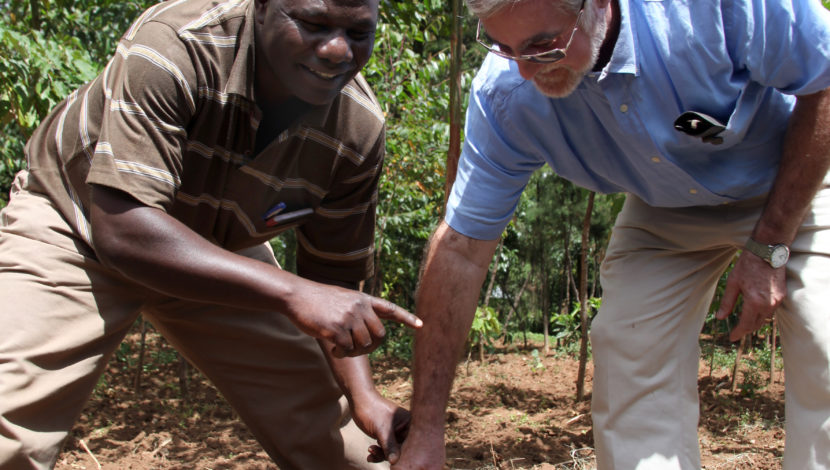The Unitarian Universalist Service Committee advances human rights through grassroots collaborations.
Stories of Hope 2014: Chrisantus Mwandihi

This story of Chrisantus Mwandihi and the SoilFarm Multi-Culture Group is presented as part of UUSC’s Guest at Your Table program.
In 2011, we told you about a project in Kenya called Hope in Crops. The story explained how UUSC was working with a village there that was trying to save their forest, water sources, and ultimately the climate. Chrisantus Mwandihi, a veteran human rights defender of the Kakamega Rain Forest, was leading the charge — and he is still at it, building on successes of the past three years.
When Chrisantus first began his work, his neighbors were cutting wood from the rain forest at increasingly damaging rates — but it seemed to be their only option to feed their families. Community members would use the wood to make charcoal, which they could then sell in order to buy food. Chrisantus knew that if they wanted to protect the rain forest, they needed to ensure people had the means to feed themselves.
Chrisantus founded the SoilFarm Multi-Culture Group (SFMG), a membership-based, community-led association, to help make that happen. By offering education about environmentally friendly agricultural techniques and indigenous food crops, SFMG made it possible for community members to sustainably grow enough food to use and sell — while preserving the rain forest and protecting their water supply too. Christantus explained: “We have these streams, but they are no longer safe. The water is contaminated because the fertilizer used in the farms finds its way into the streams as water flows downstream.” The permaculture techniques that SFMG uses ensure the health of their water sources.
SFMG has planted hundreds of thousands of trees and brought adequate nutrition and environmental education to thousands of children — and the ripple effects of this partnership are far reaching. SFMG has moved from giving families the tools to avoid starvation to leading cutting-edge research. For example, the Kenyan government heavily invested in maize but recently was forced to find alternatives because of a deadly fungus that is ruining maize crops. As Chrisantus has said, “We’ve had distortions in our weather patterns” — and those distortions caused by climate change are contributing to the spread of the fungus. The local university and the government’s agriculture department reached out to SFMG to learn more about their work with crops native to the area that can withstand evolving weather conditions.
SFMG’s overarching goal is climate adaptation and mitigation, which is becoming increasingly important. Climate change is happening: larger, stronger, and more numerous storms are being recorded; glaciers are shrinking, collapsing, and even disappearing; drinking water sources are being affected. Committed to environmental justice, UUSC continues to work collaboratively with Chrisantus, SFMG, and others not only to address current problems but to raise a new generation dedicated to protecting the environment and ensuring the rights of people most affected by climate change.
Go deeper and take action: